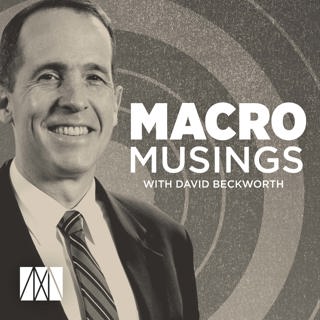
Vincent Grossmann-Wirth on the ECB in a Post-COVID Economy
Vincent Grossmann-Wirth is the Deputy Head of Monetary Policy Implementation Division at the Banque de France. Vincent joins Macro Musings to discuss the European Central Bank's response to the COVID-19 crisis and what may lie ahead for the central bank. Specifically, Vincent and David discuss how the ECB's structure and operating system compares to the US Federal Reserve System, the various dimensions of the ECB's response to COVID-19, and what the ECB's review of its operating framework portends for the future of monetary policy. Transcript for the episode can be found here. Vincent's Twitter: @VinceGW Vincent's Banque de France profile: https://www.banque-france.fr/en/economics/economists-and-researchers/vincent-grossmann-wirth Related Links: *Monetary policy measures taken by the Eurosystem in response to COVID-19* by Vincent Grossmann-Wirth https://blocnotesdeleco.banque-france.fr/en/blog-entry/monetary-policy-measures-taken-eurosystem-response-covid-19 *What Monetary Policy Operational Frameworks in the New Financial Environment? A Comparison of the US Fed and the Eurosystem Perspectives, 2007–2019* by Vincent Grossmann-Wirth https://ideas.repec.org/a/mes/ijpoec/v48y2019i4p336-352.html David's Twitter: @DavidBeckworth David's blog: http://macromarketmusings.blogspot.com/
17 Aug 202059min

David Schleicher on the Municipal Trilemma and its Implications for the Current Crisis
David Schleicher is a professor at Yale Law School, and as a returning guest to Macro Musings, he joins to talk about the historical role that the federal government has played in responding to state and local budget crises, including the municipal trllemma it faces. This trilemma says the federal government can only avoid two of the three following harms: (1) moral hazard for state budgets; (2) worsening recessions; (3) reducing future state and local infrastructure investment. Specifically, they discuss this trilemma as well as its implications for the COVID-19 crisis. Transcript for the episode can be found here. David's Twitter: @ProfSchleich David's Yale profile: https://law.yale.edu/david-n-schleicher Related Links: *Stuck! The Law and Economics of Residential Stagnation* by David Schleicher https://www.yalelawjournal.org/article/stuck-the-law-and-economics-of-residential-stagnation *Hands On! Part I: The Trilemma Facing the Federal Government During State and Local Budget Crises* by David Schleicher https://papers.ssrn.com/sol3/papers.cfm?abstract_id=3649278 *David Schleicher on Local and State Regulation and Declining Mobility* by Macro Musings https://macromusings.libsyn.com/58-david-schleicher-on-local-and-state-regulation-and-declining-mobility *The Future of Remote Work* by Adam Ozimek https://papers.ssrn.com/sol3/papers.cfm?abstract_id=3638597 *States Continue to Face Large Shortfalls Due to COVID-19 Effects* by Elizabeth McNichol and Michael Leachman https://www.cbpp.org/research/state-budget-and-tax/states-continue-to-face-large-shortfalls-due-to-covid-19-effects David's Twitter: @DavidBeckworth David's blog: http://macromarketmusings.blogspot.com/
10 Aug 20201h 4min

Jon Sindreu on Global Financial Flows and the Balance of Trade
Jon Sindreu is a reporter for the Wall Street Journal where he covers financial markets and the global transportation industry for the Heard on the Street column. Jon joins David on Macro Musings to discuss the role of global financial flows in driving global trade patterns. Specifically, Jon and David discuss the Bernanke view, loanable funds view, and money view of global financial system, as well as the implications for policy. Transcript for the episode can be found here. Jon's Twitter: @jonsindreu Jon's Wall Street Journal profile: https://www.wsj.com/news/author/jon-sindreu?mod=rsswn Related Links: *Trade Wars Are Class Wars* by Matthew Klein and Michael Pettis https://yalebooks.yale.edu/book/9780300244175/trade-wars-are-class-wars *Wages of Destruction* by Adam Tooze https://www.penguinrandomhouse.com/books/295490/the-wages-of-destruction-by-adam-tooze/ *Capital Flows, Asset Prices, and the Real Economy: A "China Shock" in the U.S. Real Estate Market* by Zhimin Li, Leslie Sheng Shen, and Calvin Zhang https://www.federalreserve.gov/econres/ifdp/capital-flows-asset-prices-and-the-real-economy-a-china-shock-in-the-us-real-estate-market.htm David's Twitter: @DavidBeckworth David's blog: http://macromarketmusings.blogspot.com/
3 Aug 20201h 3min

David Beckworth on Nominal GDP Targeting in the Wake of the COVID-19 Crisis
In this special Macro Musings episode, David is back in the spotlight, as he is interviewed by Claudia Sahm, director of macroeconomic policy at the Washington Center for Equitable Growth, as a guest on her *Stay-at-Home Macro Podcast*. David and Claudia discuss nominal GDP targeting at length, as they dive into what it is, why it's important, and how it could be implemented in the wake of COVID-19. They also talk about the communication problems related to introducing NGDP targeting as well as David's proposal for reforming the Fed's current policies. Special thank you to Claudia for letting us air this episode as a part of the Macro Musings catalog! Transcript for the episode can be found here. David's Twitter: @DavidBeckworth David's blog: http://macromarketmusings.blogspot.com/ David's Mercatus profile: https://www.mercatus.org/scholars/david-beckworth Claudia's Twitter: @Claudia_Sahm Claudia's Equitable Growth profile: https://equitablegrowth.org/people/claudia-sahm/ Related Links: Link to the original podcast: https://www.youtube.com/watch?v=1rHBQ-o8vDA Homepage for Claudia's podcast: http://macromomblog.com/sahmpodcast/ *Facts, Fears, and Functionality of NGDP Level Targeting* by David Beckworth https://www.mercatus.org/publications/monetary-policy/facts-fears-and-functionality-ngdp-level-targeting *Measuring Monetary Policy: the NGDP Gap* by David Beckworth https://www.mercatus.org/publications/monetary-policy/measuring-monetary-policy-ngdp-gap *COVID-19 Pandemic, Direct Cash Transfers, and the Federal Reserve* by David Beckworth https://www.mercatus.org/publications/covid-19-policy-brief-series/covid-19-pandemic-direct-cash-transfers-and-federal *NGDP Targeting and the Public* by Carola Binder https://www.cato.org/cato-journal/spring/summer-2020/ngdp-targeting-public
27 Jul 202044min

Bill Nelson on the Fed's Policy Tools in the Post-COVID Economy
Bill Nelson is a Chief Economist and Executive Vice President at the Bank Policy Institute, and formerly a Deputy Director of the Division of Monetary Affairs at the Federal Reserve Board, where his responsibilities included monetary policy analysis, discount window analysis, and financial institution supervision. Bill also worked closely with the Bank for International Settlements on liquidity regulations. Bill is a previous guest of Macro Musings, and he returns to the podcast to discuss the Fed's increasing role in credit policy, the prospects for yield curve control and negative interest rates, and why makeup policy would be uniquely suited to the challenges presently facing the economy. Transcript for the episode can be found here. Bill's SIFMA profile: https://www.sifma.org/people/bill-nelson/ Bill's BPI archive: https://bpi.com/tag/bill-nelson/ Bill's American Banker archive: https://www.americanbanker.com/author/william-nelson-ab3618 Related Links: *Live Live Jay Powell, the New Monarch of the Bond Market* by Robin Wigglesworth https://www.ft.com/content/5db9d0f1-3742-49f0-a6cd-16c471875b5e *Federal Reserve's "Strategies for Targeting Interest Rates Out the Yield Curve"* prepared by David Bowman, Christopher Erceg, and Mike Leahy, with contributions from William English, Edward Nelson, David Reifschneider, Nathan Sheets, and David Wilcox of Board staff and Brian Sack, Spence Hilton, Allan Malz, Frank Keane, Matt Raskin, Julie Remache, Josh Frost, Nate Wuerffel, Angela O'Connor and Richard Dzina of FRBNY staff https://www.federalreserve.gov/monetarypolicy/files/FOMC20101013memo08.pdf David's blog: macromarketmusings.blogspot.com David's Twitter: @DavidBeckworth
20 Jul 202059min

Jens Van't Klooster on ECB Bond Purchasing and the Myth of Central Bank Neutrality
Jens Van't Klooster is a postdoctoral fellow at KU Leuven and is also a member of the research group, A New Normative Framework for Financial Debt at the University of Amsterdam. Jens has recently coauthored an article titled *The Myth of Market Neutrality: A Comparative Study of the European Central Bank's and Swiss National Bank's Corporate Security Purchases.* He joins Macro Musings to talk about this article and some of his other work on central bank purchases and what it may mean for the Fed's purchase of corporate bonds. Transcript for the episode can be found here. Jens's Twitter: @jvklooster Jens's website: https://jensvantklooster.com/ Related Links: *The Myth of Market Neutrality: A Comparative Study of the European Central Bank's and Swiss National Bank's Corporate Security Purchases* by Jens Van't Klooster and Clement Fontan https://www.tandfonline.com/doi/full/10.1080/13563467.2019.1657077 David's blog: macromarketmusings.blogspot.com David's Twitter: @DavidBeckworth
13 Jul 20201h

Matthew Klein on Global Trade, Inequality, and International Conflict
Matthew Klein is an economics commentator at Barron's and is the author of a new book with Michael Pettis titled, *Trade Wars are Class Wars: How Rising Inequality Distorts the Global Economy and Threatens International Peace.* Matthew is a returning guest to Macro Musings and he joins once again to talk about his book and the domestic roots of international trade conflicts – in the past as well as today. Specifically, David and Matthew also discuss the history of how industrialized strategies, in countries such as China, have set the stage for trade conflicts in the present day. Transcript for the episode can be found here. Matthew's Twitter: @M_C_Klein Matthew's Barron's profile: https://www.barrons.com/authors/8566 Related Links: *Trade Wars Are Class Wars: How Rising Inequality Distorts the Global Economy and Threatens International Peace* by Matthew Klein and Michael Pettis https://yalebooks.yale.edu/book/9780300244175/trade-wars-are-class-wars *The Great Rebalancing: Trade, Conflict, and the Perilous Road Ahead for the World Economy* by Michael Pettis https://press.princeton.edu/books/hardcover/9780691158686/the-great-rebalancing *The Man Who Knew: The Life and Times of Alan Greenspan* by Sebastian Mallaby https://www.cfr.org/book/man-who-knew *Imperialism: A Study* by John Hobson https://oll.libertyfund.org/titles/hobson-imperialism-a-study *Communist China's Capitalism: The Highest Stage of Capitalist Imperialism* by Kenneth Austin https://www.worldeconomics.com/Journal/ViewArticle.aspx?AID=455 David's blog: macromarketmusings.blogspot.com David's Twitter: @DavidBeckworth
6 Jul 20201h 4min

Stephen Kirchner on Australian Monetary Policy in the Wake of the Great Recession
Stephen Kirchner is a program director for trade and investment at the United States Center at the University of Sydney, and he was written widely on financial markets and economy policy in Australia. Stephen joins Macro Musings to talk about the journey of monetary policy in Australia that has transpired throughout the last few decades. Specifically, David and Stephen discuss the structure of the Reserve Bank of the Australia, the history of its inflation target, how Australia was able to avoid the worst of the Great Recession, and the actions they have taken to in response to the COVID crisis. Transcript for the episode can be found here. Stephen's Twitter: @insteconomics Stephen's US Studies Center profile: https://www.ussc.edu.au/people/stephen-kirchner Stephen's Substack page: https://stephenkirchner.substack.com/ Related Links: *Money Too Tight to Mention: The Reserve Bank of Australia's Financial Stability Mandate and Low Inflation* by Stephen Kirchner http://www.institutional-economics.com/images/uploads/EAP.pdf *Cost-Benefit Analysis of Leaning against the Wind* by Trent Saunders and Peter Tulip https://rba.gov.au/publications/rdp/2019/2019-05.html *Twenty-five Years of Inflation Targeting in Australia: Are There Better Alternatives for the Next 25 Years?* by Warwick McKibbin and Augustus Panton https://www.brookings.edu/research/twenty-five-years-of-inflation-targeting-in-australia-are-there-better-alternatives-for-the-next-25-years/ *The RBA Needs a New Post-virus Monetary Policy Game* by Richard Holden, Warwick McKibbin, and John Quiggin https://www.afr.com/policy/economy/the-rba-needs-a-new-post-virus-monetary-policy-game-20200505-p54ptw David's blog: macromarketmusings.blogspot.com David's Twitter: @DavidBeckworth
29 Jun 20201h






















